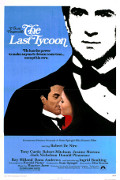
Directed by
Elia Kazan
122 minutes
Rated M
Reviewed by
Bernard Hemingway

The Last Tycoon
Elia Kazan’s reputation fell under a heavy cloud because of his co-operation with HUAC in the 1950s but this film would have been enough to wash it down the drain. What he and producer Sam Spiegel were trying to do with it is far from apparent although in the broadest sense one might say “make a work of art”. What they have made is an excruciating film that is of some interest simply because of the top drawer talent involved, including Kazan himself
Based on F.Scott Fitzgerald’s unfinished novel that was in turn based on the real life figure of Irving Thalberg, production chief at M-G-M from the 1920s until his death at the age of 37 in 1936, and adapted for the screen by Harold Pinter, The Last Tycoon is a portrait of Monroe Stahr, a “boy genius” studio producer and his unhappy love affair with a young English lass, Kathleen Moore (Ingrid Boulting, an actress who only made a handful of films, none with as high a profile as this).
Kazan goes to a lot of trouble to simulate movies in the 30’s- 40s Hollywood studio style with a variety of tongue-in-cheek recreations that poke fun at the production line process. The trouble is that his own film seems just as contrived. “Trouble" because it’s not clear whether what we see is intentionally or accidentally bad. Some of the gaffes are so maladroit it would seem that they are intentional but why so is impossible to tell.
Numerous questions arise: Is Ingrid Boulting such a bad actress or did Kazan ask her to imitate a block of wood?; who came up with the idea of casting Hollywood veterans like Ray Milland, Dana Andrews, Tony Curtis, and Robert Mitchum, let alone Jeanne Moreau in minor roles?; when Monroe and Kathleen, in the best scene in the film, make love at the site of his beach house which is no more than a timber frame, where does the electricity for the heater and lights come from?; why do random lines of dialogue get repeated?; why is the editing, a post-production role made much of in the film itself, so cavalier? (e.g. in the writer’s ball scene the band is not playing but there is music on the soundtrack); why when Theresa Russell (making her feature film debut) takes Monroe to her room after he has been beaten by Jack Nicholson's union rep. is the wall covered with photographs of her that all look like they were taken in the 1970s? The list could go but suffice to say that with The Last Tycoon one is as much aware of watching Kazan's film as his characters in the viewing suites are of watching theirs, making for a rather surreal kind of symmetry but hardly one that is dramatically effective (the film also provides a rare instance of an unconvincing performance by De Niro who had just finished playing Travis Bickle in Taxi Driver and would appear the following year much more in possession of his character in another period piece, New York, New York)
The result is a slightly ghoulish experience (it was Kazan’s last film although he lived until 2003) that might hold some appeal for film buffs but does not stand on its own merits.
Want something different?





